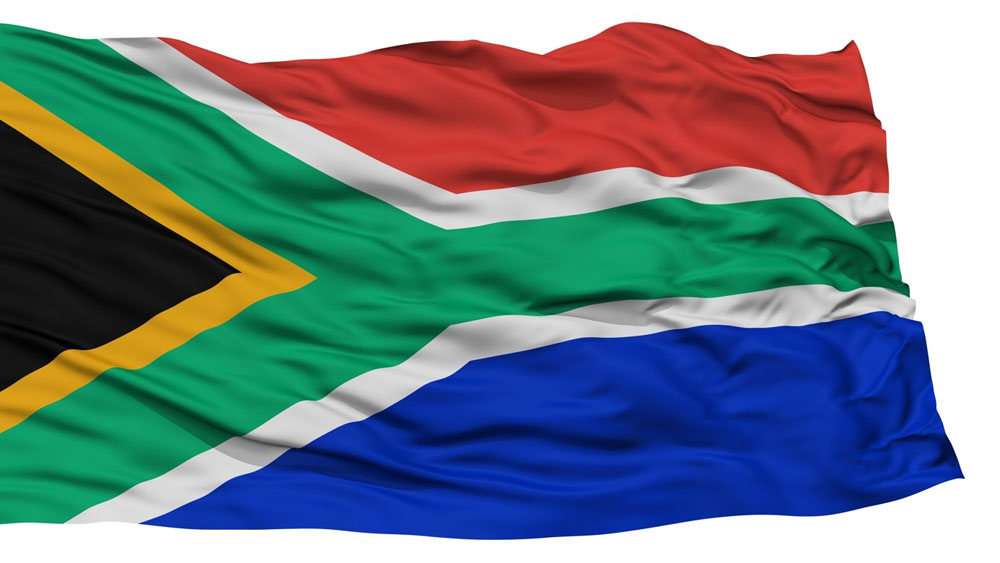
Learning a foreign language or improving your existing language skills is not always easy. Especially in the hectic everyday school or work life, there is hardly any time to actually devote enough time to learning vocabulary, even though this would be so important in order to actually internalize what has been learned in a language school here in Switzerland.
So what to do? A language course abroad would be an interesting option, perhaps in South Africa. But is it really a good idea to attend a language course in Cape Town or Johannesburg? Should you only travel in winter when it's not quite so hot and do you need a visa? What does South Africa actually have to offer besides elephants and giraffes?
Clearly, much more. The country with eleven national languages is not only a country of the Big Five, but also a member of the G20 economic powers and a founding member of the United Nations. You'll find everything in South Africa: huge mansion districts, dreamy historic towns, Bushmen (San), wine regions, snow-capped mountain peaks, the Karoo Desert, slums and penguins. What? Penguins? Yes, on Boulders Beach in Simons Town, about a 45-minute drive from Cape Town, there is a colony of spectacled penguins living in temperatures well above freezing.
South Africa is so diverse that every language study trip can be enriched with a wide range of activities and excursions, such as guided safaris or wine tours, a cable car ride to Table Mountain, an overnight stay in a lodge in the Addo Elephant National Park or a hot-air balloon ride over the Kruger National Park. And that's exactly what a language study trip to South Africa is all about - the perfect combination of learning English, cultural life and nature experiences!
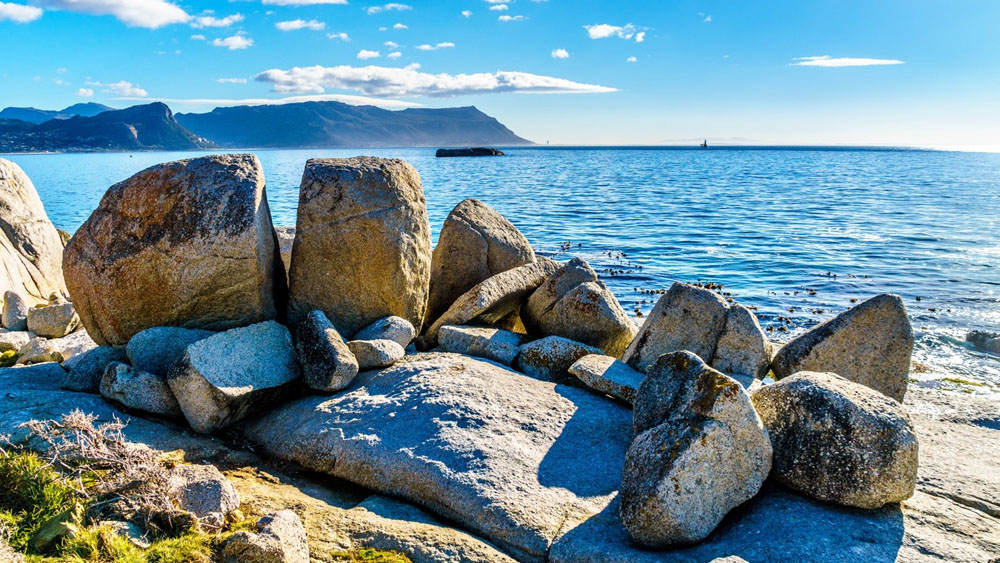
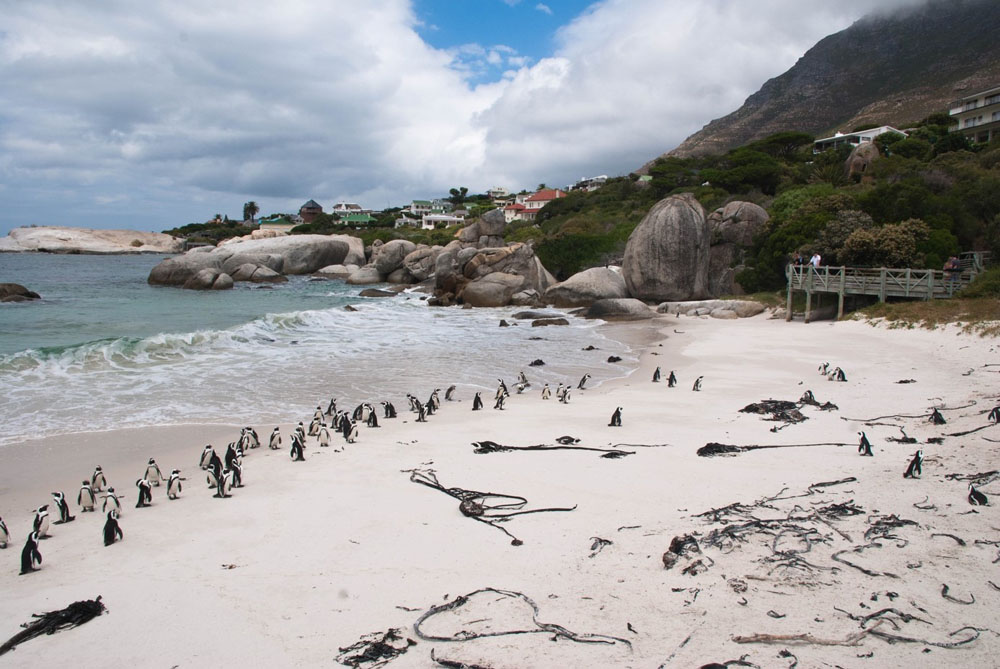
Although South Africa is not a small country, most of the country's language schools are located in just a few cities. Cape Town in particular, the country's second largest city, is an extremely popular tourist destination and attracts many language students every year who want to improve their English language skills in one of the city's many prestigious language schools. Cape Town itself and the surrounding metropolitan area are home to around 3.7 million inhabitants, just under 16% of whom are white, which is well above the national average, and over 32% in the city center. The mix of population groups, which includes Coloureds, who make up the majority of the population, Blacks and Asians as well as Whites, also contributes to a linguistic diversity that makes English, Afrikaans and isiXhosa the most widely spoken languages in the metropolitan municipality.
Cape Town attracts visitors with its proximity to the Atlantic and Indian Oceans, Table Mountain, the beaches, the Victoria and Alfred Waterfront, the lively downtown and, of course, the Cape of Good Hope. A language study trip to Cape Town promises colorful hustle and bustle and a pleasant proximity to the Winelands, open-minded locals and a culinary, musical and culturally diverse day and nightlife.
But not all language students are drawn to Cape Town in the Western Cape; some prefer the Eastern Cape, around 770 kilometers east of Cape Town. There, in Port Elizabeth, with its miles of sandy beaches and the famous Boardwalk, language travelers who don't want to miss out on beach fun will get their money's worth. Although only around 80 kilometers away, the small town of Jeffreys Bay offers a relaxed alternative program. At the start or end point of the Garden Route and the Sunshine Coast, Jeffreys Bay is an ideal surfing hotspot with impressive waves, friendly locals and lovely beach bars.
Although Johannesburg is the largest city in the country, it is not necessarily recommended as a destination for a language study trip in South Africa due to its high crime rate, one of the highest in the world. Vacationers usually only spend a few days there, for example as a stopover on the way to Kruger National Park, Cape Town or Durban. Language travelers will also find attractive language schools in Durban where they can improve their English skills, as well as in Pretoria, Bloemfontein and Johannesburg, but it is mainly Cape Town, Jeffrey Bay and Port Elizabeth that attract language students from all over the world.
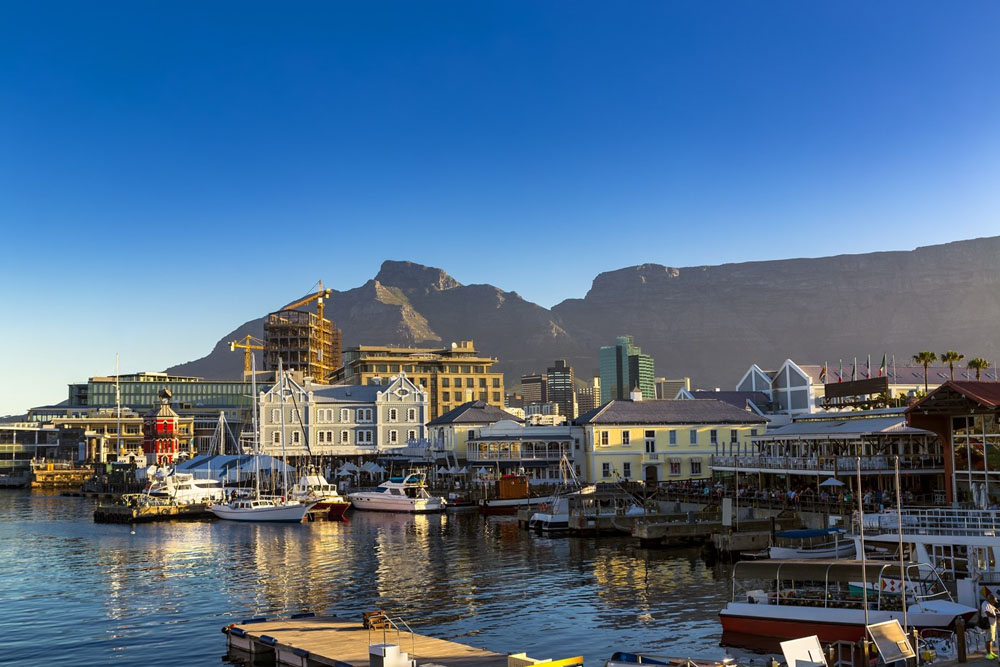
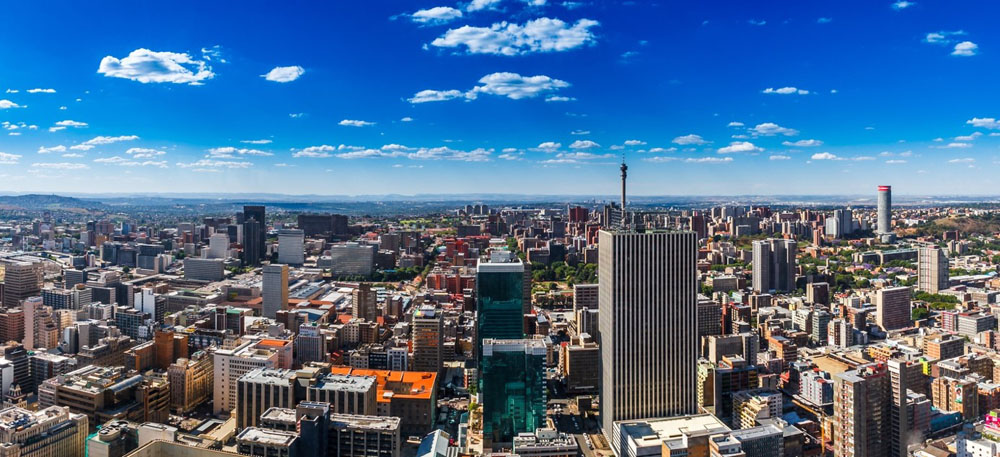
You could fly non-stop from Zurich Airport to Johannesburg in ten and a half hours. However, you usually have to take a multi-stop flight to Cape Town for your language study trip in South Africa, which means that you will be on the road for between 14 and 26 hours. Depending on where you have a stopover, you might want to consider adding a longer stopover to your language study trip. For example, if you have a flight to Cape Town and a stopover in Johannesburg, you could extend this stop and start or end your language study trip with a safari in Kruger National Park.
Since you won't be able to reach your destination from Switzerland very quickly, especially if your language course is not in Johannesburg or Pretoria, your language study trip to South Africa should not be limited to two or three weeks if possible. For such a short period of time, the journey is too far and too inconvenient, and the country is far too spectacular to explore all its wonderful diversity in such a short period of time. So take as much time as you can get and travel the country by rental car or coach after, before or between your English course.

One of the most important travel tips for South Africa is clearly the fact that South Africa is located in the southern hemisphere, which means that the seasons are opposite to ours. This means that winter prevails in South Africa from June to August and summer from December to February. However, the temperatures and climatic conditions in the individual regions of South Africa can vary greatly, depending on the distance from the sea and the altitude. For Johannesburg, for example, which lies at an altitude of 1753 m, this means that even in the height of summer it hardly gets warmer than 30 °C and the night temperatures are pleasantly cool. Winter in the area around Johannesburg is also good for traveling, with temperatures of up to 25 °C, but is often very windy in August. Rain usually only falls in the months from October to March.
If you want to enrich your language study trip in South Africa with a visit to Kruger National Park, you should be aware that temperatures in the Lowveld region in the north-east can reach 40°C and above in summer and that there is also heavy rainfall during this time. The result is a hot and humid climate. It is much more pleasant and drier in the winter months from June to August. This time of year is also ideal for game viewing, as the animals come to the waterholes to drink in the mornings and evenings and the trees and bushes are not covered in leaves.
Further east around Durban in the KwaZulu-Natal province, the Indian Ocean offers year-round bathing weather, with temperatures around 30°C in summer and well over 20°C in winter, although the southern beaches are cooler than those in the north. From October to April, but especially from December to January, you can expect heavy thunderstorms and downpours, which occur daily, usually in the afternoon.
If you want to visit the Drakensberg Mountains of KwaZulu-Natal, you can expect heavy thunderstorms and sometimes days of rain in summer. June, July and August are pleasant and dry at 20°C, but due to the altitude of up to 3000 meters and above, the winter nights are sometimes freezing cold with temperatures below zero. April and May are highly recommended for the Drakensberg.
The Eastern Cape is ideal for traveling all year round, although heavy rainfall does occur in summer, albeit less than in many other regions. Despite the mild winter weather, the water temperatures for swimming are not necessarily pleasant for everyone.
As one of the areas with the most rainfall, the region around the Garden Route is divided into winter rainfall and summer rainfall areas. Temperatures reach up to 35°C in summer, but bathing temperatures are usually too low in winter.
Cape Town and the Cape region have a temperate Mediterranean climate with daytime temperatures of 25 to 30°C in summer and winters rarely cooler than 10°C. Rainfall is usually only to be expected in the winter months. Rainfall is usually only to be expected in the winter months, but strong winds prevail all year round, especially in the northern parts of the city and at the Cape of Good Hope. Not only the wind, but also the Atlantic Ocean makes it unpleasant to swim in the waves in many places in Cape Town - even in summer it is often no more than 20°C. The beaches on the eastern side, which are warmed by the Indian Ocean, are a little warmer. Stellenbosch, Paarl, the Cape Winelands and Franschhoek are usually two to three degrees warmer. Traveling in the Cape region is most pleasant from February to April.
The climate in the semi-desert landscape of the Karoo is usually bearable even in summer, even if temperatures of 35°C and above are quite normal. At 40°C, the temperatures in the lower reaches of the Orange are much higher due to the lower altitude, making May to September a good time to travel when the nights are pleasantly cool in the southern winter. The northwest of South Africa is best visited in spring, the Kalahari Basin from June to August.
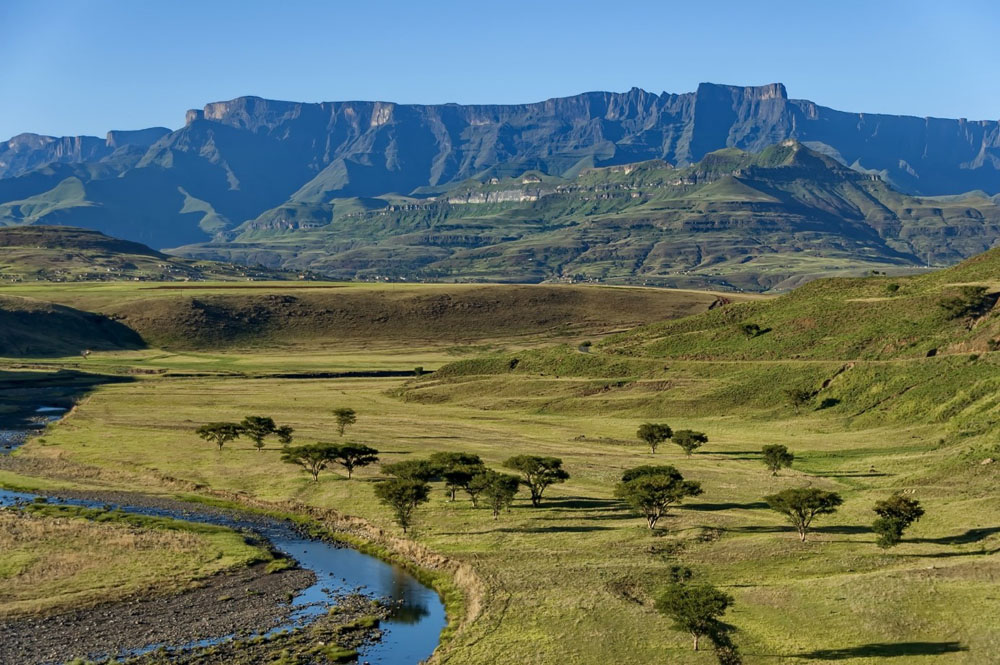
The selection of language courses at South African language schools is generally far less extensive than at language schools in England, the USA, Canada, New Zealand or Australia. You will find standard and intensive language courses at all language schools in the country, where you usually attend 20 or 30 lessons per week. Individual lessons can also be booked almost everywhere, as can combined language courses, such as standard and business courses, standard and individual lessons or, depending on the region, standard courses and surfing, for example in Jeffreys Bay. You can prepare for Cambridge certificates at the language schools in Cape Town or Port Elizabeth.
Swiss citizens who wish to complete a language study trip to South Africa do not require a visa if they intend to stay in the country for less than three months. In this case, a return flight ticket and a passport valid for at least 30 days after the return date are sufficient. If you want to study English extensively and stay in South Africa for longer than 90 days, you will need a student visa, which can be applied for at the embassy in Bern or the consulate in Geneva. Alternatively, language students who wish to stay in the country for longer than 90 days, but do not wish to attend a language course for longer than 90 days, can apply for a tourist visa on site, which is valid for a further three months. However, please always find out about the current entry requirements for South Africa and the necessary documents from theSouth African Embassy in Bern.
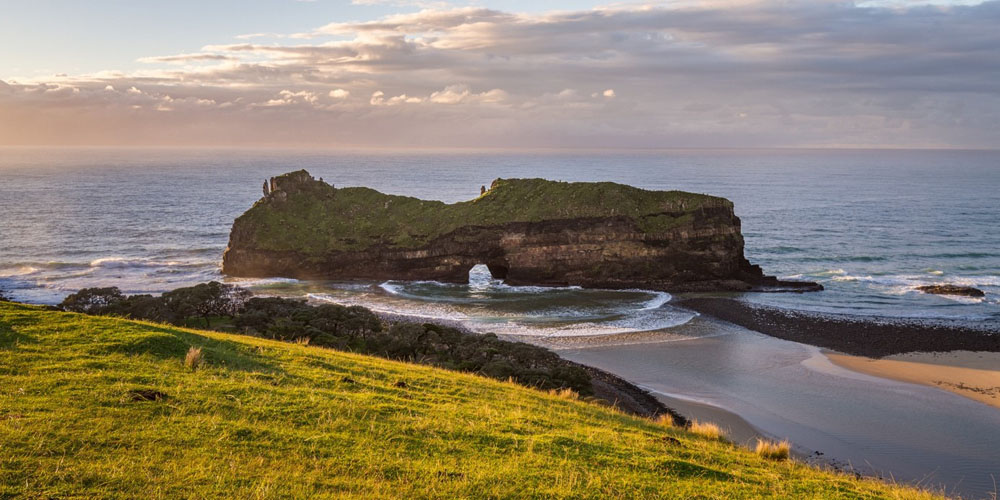
Although the living conditions of many South Africans have improved considerably in recent decades, there is still a great deal of social inequality and, in some cases, considerable poverty throughout the country. As a result, crime and violence are sometimes very high, especially in the major cities of Cape Town, Pretoria, Johannesburg and Durban. Tourists and language travelers should exercise particular caution there and inform themselves in advance about the recommended precautionary measures of theDFAinform.
The cost of a language study trip in South Africa varies greatly depending on the type of language course, the duration, the type of accommodation, the food, the school and, last but not least, the excursions and activities that are undertaken at weekends and in the afternoons or evenings. A four-week language course including a standard language course and accommodation with a host family in a single room with half board will cost you between CHF 2,000 and CHF 2,700. Other language courses, such as those preparing for Cambridge certificates, usually have a fixed duration of around six to ten weeks and are also more expensive than standard language courses due to their intensity and focus. Always pay attention to the currency in which the information is given, as this can vary greatly depending on the language travel provider. It makes sense to quote prices in South African Rand (ZAR).
Please note that in addition to the costs for the language course and accommodation, there is always the flight and transfer, which can vary greatly in price depending on the airline, duration, number of stops and time. Flights are available from less than CHF 600, while others cost twice as much or more. It is best to find out about flight prices some time in advance and remain flexible if possible. The money you save can be put to very good use for your language study trip to South Africa. Not that everything there is extremely expensive. But you will certainly want to see one or two things. Guided safaris or wine tours, marveling at penguins, a cable car ride to Table Mountain, meals, shopping, going out - all of this is included and should be factored into your budget. A language study trip in South Africa is certainly not significantly more expensive than a language study trip on other continents and can therefore be quite affordable. However, it is usually cheaper for Swiss language travelers in Malta, Scotland and Ireland. But without the penguins, elephants and giraffes.